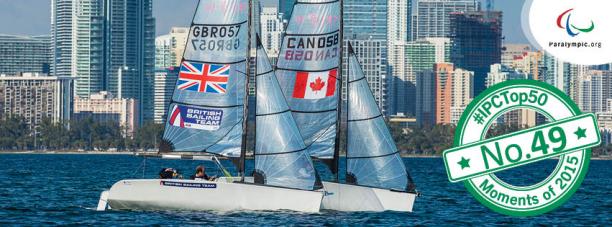No. 49 Sailing takes action
13.11.2015The International Federation has honed in this year on developing the sport.
 Top 50 2015 - No. 49 Sailing takes action
© • Walter Cooper
Top 50 2015 - No. 49 Sailing takes action
© • Walter Cooper
- Related Features
- No. 50 Brazil beat Canada in OT at Toronto 2015 boccia finals
It was disappointing news, but one that prompted sailing to act.
The sport learned in February that it would not be included in the Tokyo 2020 Paralympic Games after falling short of the International Paralympic Committee’s (IPC) criteria for the Paralympic programme. But four months later, the International Sailing Federation (ISAF) put together the Disabled Sailing Committee and shortly after launched the Paralympic Development Programme. Their response comes in at No. 49 in the IPC’s Top 50 Moments of 2015.
Betsy Alison, a US Sailing Paralympic Coach, was appointed Chair of the ISAF Disabled Sailing Committee. In June, the ISAF also added more members to the committee, which is comprised of 10 members all from different countries.
“It was very disappointing for every one that sailing was dropped from the Paralympic programme for 2020 in Tokyo,” Alison said. “However ISAF and the entire staff and organisation have been fully supportive in helping us to make the effort in getting back into the 2024 Games.”
There are six core requirements sports had to meet to be included in Tokyo 2020. Among the criteria was that sports needed to have a worldwide reach of at least 32 countries practicing widely and regularly. Sailing could not provide evidence of that requirement, making Rio 2016 its last Paralympic appearance — unless it can be reinstated.
“The ISAF Executive Committee took immediate action by constituting a new Para World Sailing committee as well as approving a budget of GBP 104,000 for a Paralympic Development Programme to bring in new emerging nations into Paralympic Sailing,” Alison said. “The number of emerging nations participating in Para World Sailing Para World Sailing Championships [24 November – 3 December in Melbourne, Australia] has increased, and we're also looking into introducing an exciting new format for future Paralympic Games, as well as a regional qualification system and cost effective equipment.”
In August, the ISAF held their first Paralympic Development Programme clinic in Weymouth and Portland, Great Britain, the site where the sport held its competitions during London 2012.
Sailors from various nations, including Hong Kong, China, Portugal and South Africa, participated in the five-day clinic.
The ISAF also published a You Tube video updating on what happened, giving personal anecdotes and additional background about the new programme.
Through social media and other digital means, the ISAF has also actively publicised that they have a plan in place to extend the sport’s reach.
“We want to make the sport more cost effective [such as the type of boat used], and we'll be looking at introducing existing, well established equipment that has a broad worldwide reach,” Alison said on the next step in development.
While it seems the focus so far has been on developing the sport, the ISAF has ensured that the pathway from learning to sail to high performance is covered.
“This is done through regional Nominated Experts, so expert coaches, who help the emerging nations come to parity with established countries and more developed nations,” Alison said. “We will be making information readily available to any national sailing federation through an adaptive sailing manual and providing guidance and educational resources to anyone worldwide, at no cost.
Alongside this, we will put a priority on a regional qualification system for future Paralympic Games … A robust competition schedule is also vital to ensuring competitiveness in the high performance arena. Para world sailing events held in conjunction with the Olympic Sailing programme at high profile events, such as the Sailing World Cup and Regional Games will guarantee competitive competition with a range of nations in attendance.”
To find out more about the IPC’s Top 50 Moments of 2015, visit the dedicated page on the IPC’s website.



















